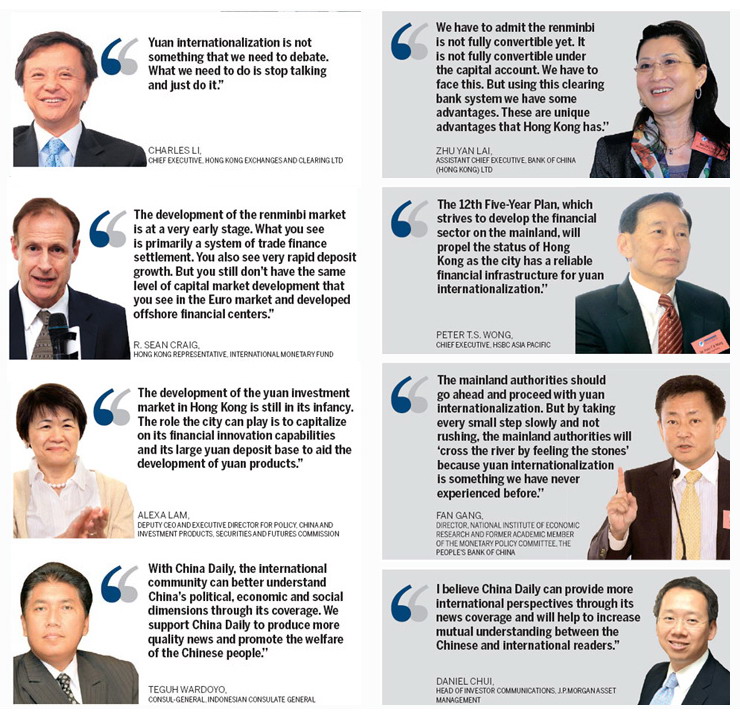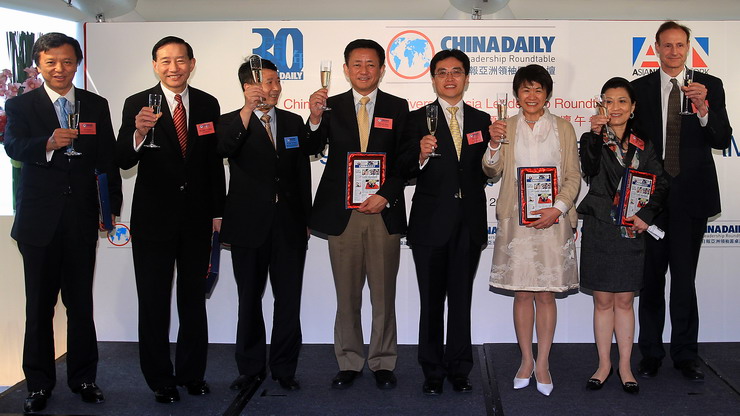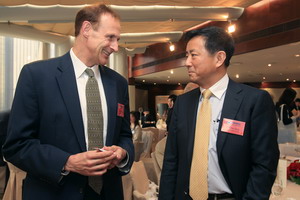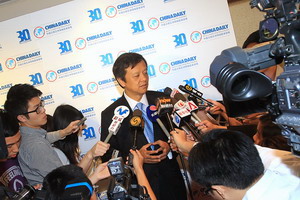|
 |
|
|
Editor's note: The roundtable, held on June 2, is entitled "Hong Kong and the Internationalization of the RMB". Debate over the internationalization of the yuan has moved forward from speculating on whether it will happen to looking at how China will manage the process. What is the role of Hong Kong in helping the currency play a more important role in the global economy? |
|
|
Zhou Li (fourth, right), publisher of China Daily Asia Pacific and chairman of Asia Leadership Roundtable, and panelists of the Asia Leadership Roundtable raise their glasses to toast China Daily's 30th anniversary. The penalists are: Charles Li (L1), Chief Executive, Hong Kong Exchanges and Clearing Ltd; Peter T.S. Wong (L2), Chief Executive, HSBC Asia Pacific; Hao Tiechuon (L3), Minister of Publicity & Sports Department, Central Goverment Liaison Office, HKSAR; Fan Gang (L4), People's Bank of China; Alexa Lam (R3), Deputy CEO and Executive Director for Policy, China and Investment Products, Securities and Futures Commission; Zhu Yan Lai (R2), Assistant Chief Executive, Bank of China(Hong Kong) Ltd; R. Sean Craig (R1), Hong Kong Representative, International Monetary Fund. [Photo / China Daily] Hong Kong a key player in helping the yuan go global
Debate over the internationalization of the yuan has moved forward from speculating on whether it will happen to looking at how China will manage the process. And what is the role of Hong Kong in helping the currency play a more important role in the global economy? "Policy makers regard Hong Kong as a reliable and well-run market to run the first stages of internationalization," said Peter Wong, chief executive of HSBC Asia Pacific and one of Hong Kong's leading bankers. Wong was speaking Thursday at the China Daily Asia Leadership Roundtable on "Hong Kong and the Internationalization of the RMB". The roundtable marked the 30th anniversary of the newspaper. Six of Hong Kong and the mainland's leading financial and economic figures were brought together for the event.
Wong warned against focusing all efforts on Hong Kong creating an international currency, but rather remember that the ultimate goal is to use Hong Kong as a gateway for a more internationalized yuan. "The world is all about internationalization. Test it (the yuan) in Hong Kong and move it out to other countries," Wong said. As the debate continues over the role the yuan will ultimately play on the global stage, all those present agreed that the mainland's currency will ultimately become more internationalized. "Things are moving very fast," said Professor Fan Gang, director of the National Institute of Economic Research and a former academic member of the Monetary Policy Committee of the People's Bank of China. [Full story]
 Inflation could peak this month: Prof Fan Gang China's inflation will very likely peak by the end of this month, Fan Gang, a former senior advisor to the People's Bank of China (PBoC), told China Daily in an exclusive interview on Thursday. "Previously, we forecast a peak in May or June," said Fan, an economics professor at Peking University and the graduate school of the Chinese Academy of Social Sciences. While the severe draught that has hit southern China has caused some uncertainties, inflation is still expected to peak by the end of June, he said. [Full story] |
Celebrating China Daily's 30th anniversary More than 130 government officials, business leaders and representatives of the media took part in a roundtable entitled "Hong Kong and the Internationalization of the RMB" on Thursday. The event, the China Daily Asia Leadership Roundtable, was also held to mark the occasion of the 30th anniversary of the inaugural edition of China's only national English-language newspaper. Peter Wong, chief executive of HSBC Asia Pacific, was the honorary chairman. He and several other prominent guests also attended the panel discussion on the internationalization of the yuan. Among them were Charles Li, chief executive of Hong Kong Exchanges and Clearing Ltd; and Fan Gang, director of the National Institute of Economic Research. Zhou Li, publisher of China Daily Asia Pacific and chairman of Asia Leadership Roundtable, gave the opening address. "China Daily Asia Roundtable has emerged as a meeting of great minds and ideas and a platform to renew and strengthen strategic partnerships," Zhou said. Launched in December 2010, China Daily Asia Leadership Roundtable is an assembly of movers and shakers in the region who share their insights on strategic issues relating to economic, business and social developments in Asia. The aim is to enhance communication and increase mutual understanding between China, the region and the rest of the world. Like the China Daily CEO Roundtable, which made its debut in 2004, China Daily Asia Leadership Roundtable is another milestone in the three-decade-long history of China Daily, which Zhou referred to as "a journey of grit, gumption and gusto". Launched as an eight-page national English daily on June 1, 1981, China Daily has over the past 30 years become a global media group with 12 publications under its umbrella. Covering everything from the world's political and economic situations to the latest trends in music and art, China Daily has become the most cited news source with an average daily circulation of more than 400,000. Its website boasts daily page views of more than 31 million. Reflecting on the paper's 30 years of existence, Zhou said, "China Daily has surmounted many challenges, but has never been static." In a move to further reach out to its audiences worldwide and become their voice, the newspaper last year launched its Europe and Asia editions. And that isn't all. China Daily Asia Weekly, currently distributed in five countries and regions including Japan, Thailand, Indonesia, Hong Kong and Macao, will soon become a news staple for people living in Australia, India, Malaysia and a few Gulf countries, according to Zhou. And China Daily is going to Africa as well. All this, noted Zhou, is "in response to the world's interest to know China" and "China's eagerness to know and reach out to the world". |
|
 |
|
|
Recently, HSBC bank released an upbeat survey predicting that China's currency, the renminbi (RMB), will become one of three global settlement currencies, alongside the dollar and euro, some time this year. The RMB's internationalization seems to have been progressing without anyone really noticing. The key remaining questions concern whether or not the RMB will become an important international currency anytime soon, and whether it is poised to pose a serious challenge to the US dollar's domination of the international monetary system. [Full story] |
|
|
China would progressively make its currency, RMB, convertible on the capital account in the next five years amid its push for the deeper internationalization of the currency, Yi Gang, head of the State Administration of Foreign Exchanges (SAFE), in a signed article published on SAFE website. [Full story] |
|
Internationalization of yuan is a timely call One of the lessons China has learned from the financial tsunami which struck the world in 2008 is that the overwhelming dominance of the US dollar in the international financial market is an unstable factor in the global economy and financial system, and that the mismatch of the yuan's global position with the country's growing economic, trade and financial significance needs changing. [Full story] |
|
Internationalization of RMB foreseeable: Expert A famed Chinese economic expert forecasted at a forum in Tokyo on Tuesday that it would not take long for the yuan to be internationalized though there was no timetable available. Liu Guangxi, a professor and director of the science and technology department under the State Administration of Foreign Exchange (SAFE), made the comment when delivering a speech at a forum about the roles China and Japan will play in finance cooperation in Asia. [Full story] |
|
|
 |
|


